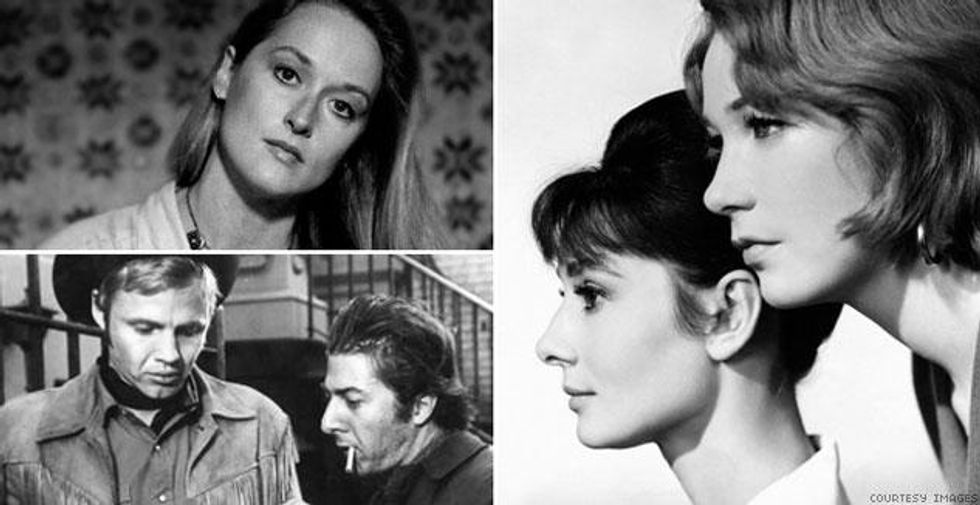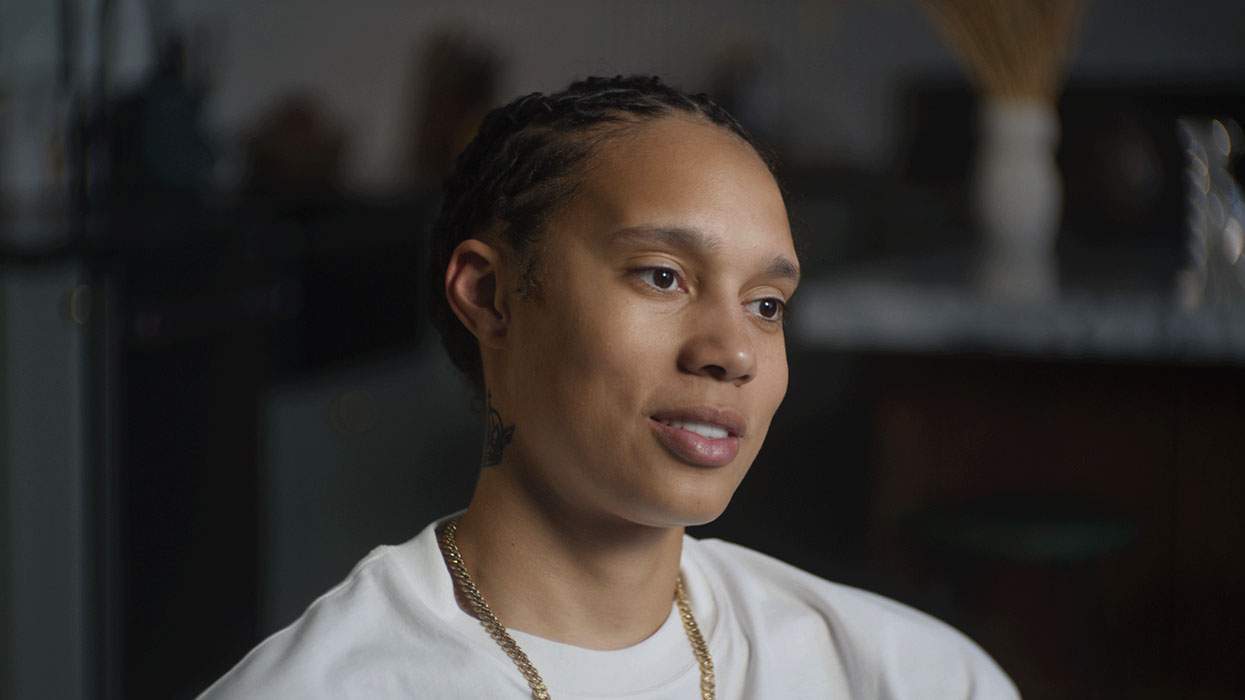
Suddenly, Last Summer (1959)
Based on a play by Tennessee Williams, the acclaimed Suddenly, Last Summer starred Elizabeth Taylor, Katharine Hepburn, and Montgomery Clift. Taylor plays Catherine, a young woman recently institutionalized after her cousin Sebastian died while the pair traveled abroad in Spain. Hepburn is Violet, Sebastian's wealthy mother and Catherine's aunt, who is determined to hide the truth behind her beloved son's demise -- even if that means giving Catherine a lobotomy courtesy of Dr. John Cukrowicz (Clift). But as the doctor probes deeper into her psyche, he discovers things aren't what they seem. Spoiler alert: Sebastian used Catherine to lure attractive young men for him to have sex with, and a group of them killed Sebastian in an especially barbaric gay-bashing.
At the time, the release of a film depended on whether it met the standards of the Production Code (this was before the Motion Picture Association of America's rating system) and the film was approved to depict Sebastian as gay only "since the film illustrates the horrors of such a lifestyle, it can be considered moral in theme even though it deals with sexual perversion."
The Children's Hour (1961)
Starring screen legends Audrey Hepburn, Shirley MacLaine, and James Garner, The Children's Hour follows Martha (MacLaine) and Karen (Hepburn), college friends who operate a private school for girls. Chaos ensues after a disgruntled student accuses the pair of being lesbian lovers. Spoiler alert: One of the women is indeed gay and in love with her coworker, and things don't end well for her.
Though a box office flop, the movie opened to critical acclaim, and received five Academy Award nominations and three Golden Globe nods, including one for MacLaine for Best Actress.
Victim (1962)
This British film, cowritten by a woman (Janet Green with John McCormick), was a repudiation of that nation's harsh antigay laws. A mystery and thriller at heart, Victim follows a successful, married lawyer avenging the death of his young male lover. A blackmailer is targeting London's gays, demanding money in exchange for keeping secret their same-sex affairs; many financially strapped victims commit suicide rather than face prison or humiliation. The insidiousness of government-sponsored homophobia is at the forefront of the movie, which is revolutionary for its depiction of a bisexual protagonist not to be messed with; he's the furthest thing from a victim. A must-see.
Advise & Consent (1962)
A thrilling political film directed by Otto Preminger and starring Henry Fonda, Advise & Consent explores the ugly nomination process for a new secretary of state. Amid the political wrangling is a blackmail plot involving a Utah senator played by Don Murray. By all accounts a happy family man, the senator apparently had a gay ol' time in Hawaii that's now come back to bite him in the butt. As you can guess, it doesn't end well. Bonus: Betty White has a cameo as a Kansas senator.{C}
The Haunting (1963)
This classy psychological horror movie was one of the first films to feature a lesbian story line, though it was subtle and implied. It follows a group of people asked to spend a few nights in a haunted house, and stars Julie Harris as Eleanor, the character most sensitive to the paranormal activity going on around her. Claire Bloom plays Theodora, a gay psychic who takes a very distinct liking to Eleanor. Theo's depiction is surprisingly delicate, as opposed to typically sensational. The Haunting was remade in 1999, starring Liam Neeson, Lili Taylor, and Catherine Zeta-Jones as Theo.
The Killing of Sister George (1968)
This lauded film, at times hard to watch, is a lesbian cult classic. June Buckridge (Beryl Reid) plays a character called Sister George on a British soap opera, but her life starts to unravel after she loses her job due to a decline in the show's ratings. She responds by drowning her sorrows and insecurities with alcohol, leading her to act in unimaginable ways. Susannah York plays Childie, the woman June is living with, and Coral Browne plays Mercy Croft, June's producer and the woman who comes between them. One of the film's pivotal scenes was shot at an actual lesbian watering hole in London called the Gateways Club, with patrons used as extras. At the time of its completion, the MPAA gave the movie an X rating, mainly due to a graphic (for its time) love scene between Mercy and Childie.
Midnight Cowboy (1969)
This depressing drama from gay director John Schlesinger stars Jon Voight and Dustin Hoffman as hustlers who enter into a "complicated" business relationship while working the streets of New York. The film received an X rating from the MPAA due to its "homosexual frame of reference and possible influence upon youngsters," and ended up being the only X-rated film to win the Best Picture Academy Award. The homosexuality was more implied than featured -- the relationship between Voight and Hoffman is not what you'd call passionate -- but there is a memorable scene with Voight being serviced by a young man at a movie theater. The film also won awards for Best Director and Best Adapted Screenplay, and received nominations for Best Actor (both Voight and Hoffman), and Best Supporting Actress for Sylvia Miles.
Myra Breckinridge (1970)
Based on Gore Vidal's novel, this bonkers movie -- described by some as the worst ever produced -- is a literal trip (many cast and crew members were reportedly high during filming). Raquel Welch plays the title character, a transgender woman attempting to expose the misogyny of the movie industry. Mae West costars as a hypersexual Hollywood doyenne, and Farrah Fawcett is featured in a sapphic scene between her character and Myra's.
None of it made much sense, but it was wonderful to see all the notions of gender and sexuality upended; it portended the freewheeling decade to come.
{C}
The Boys in the Band (1970)
It may surprise some millennials that the director of The Exorcist, William Friedkin, also made an infamous movie about gay men. The Boys in the Band, based on a play, focuses on a group of queer friends living tragic lives in New York; one's a drunk, another's bitchy, there's one with a shopping addiction, and on and on. The acting and production are top-notch; it's just that the men seem so unhappy. Is it dreary or accurate? The jury's still out.
Some of My Best Friends Are (1971)
Mostly forgotten, this groundbreaking movie centered around a raucuous night in a Greenwich Village gay bar. With a cast that included everyone from Fried Green Tomatoes author Fannie Flagg to Golden Girl Rue McClanahan to Warhol star Candy Darling, this slice of New York queer life is worth 110 minutes of your time. From the film's trailer: "A penetrating insight to a world which actually exists today, it tells in one human story the many stories of its people ... some outrageously funny ... some shockingly grotesque ... and some of heart-rending emotional impact. The producers have attempted to portray events with full honesty and therefore the film's content may sometimes be objectionable for viewing by younger audiences. But for those who can stand the truth ... it is provocative adult entertainment."
Sunday Bloody Sunday (1971)
This sexually frank British drama centers around a love triangle between two men and a woman. A young female professional and a male doctor are both in thrall with a tempestous artist played by Murray Head. The realistic portrayal of adult relationships endeared the film to many queer filmgoers of the time, who especially appreciated the fact that none of the LGBT characters offed themselves before the credits rolled. You can credit gay director John Schlesinger for that; yes, the same John Schlesinger who directed the lauded Midnight Cowboy and the absolutely derided Madonna vehicle The Next Best Thing. Bonus: Daniel Day-Lewis, then a teenager, has a small, uncredited role. The actor would go on to star in one of the most beloved gay films of the early AIDS era, My Beautiful Laundrette.
Cabaret (1972)
This movie musical is loosely based on the stage play by the same name, which itself was inspired by a Christopher Isherwood book (millenial reminder: Isherwood was the also the author of A Single Man, which was turned into a 2009 Tom Ford film). Bob Fosse directed the lush Cabaret, and it starred Liza Minnelli, Michael York, and Joel Grey (who just came out at age 82). It follows the lives and loves of the performers at the sexually charged Kit Kat Klub, a 1930s German nightclub where all are welcome. Sally falls for bisexual Brian, Brian sleeps with Max, Max sleeps with Sally, that's how it goes.The film was nominated for 10 Academy Awards, and won eight, with Minnelli, Grey, and Fosse all taking home gold.
{C}
The Last of Sheila (1973)
This dated thriller/mystery is still a favorite of many, partly thanks to a wackadoodle plot revolving around a glamorous group of Hollywood glitterati yachting around the Mediterranean. There's also a murder, a character based on the famous film agent Sue Mengers, and people with "gay pasts." In the course of the film, secrets of friends are revealed; one is a hit-and-run killer and another is gay (similar offenses, right?). Written by rumored lovers Stephen Sondheim and Anthony Perkins (that would be the famous composer and the star of Psycho), The Last of Sheila lifted a campy veil on the gay aesthetic that remains so integral to Hollywood.
Female Trouble (1974)
For any millennial unfamiliar with out writer-director John Waters: Shame on you! You're forgiven, as long as you run, don't walk, to see Female Trouble, Waters's second film. His debut feature, Pink Flamingos, is a little much, but Female Trouble has just the right amount of plot and insanity to keep you roaring with laughter -- and amazed that this was got made in the Nixon era. Waters's muse, the corpulent drag goddess Divine, stars as teenage delinquent/go-go dancer/single mother/child killer/fishmonger Dawn Davenport. The movie attacked every American convention (for example, an obese aunt played by Edith Massey repeatedly tries to convince her straight nephew to go gay because "If they're smart they're queer, if they're stupid they're straight").
La Cage aux Folles (1978)
This French-Italian film about a middle-aged gay couple, Renato (Ugo Tognazzi) and Albin (Michel Serrault), who try to pose as straight to win over their son's fiancee and her conservative parents, walked the tightrope between homage and stereotype -- the gay characters were over-the-top but still lovable (compare that to The Boys in the Band). La Cage was nominated for three Academy Awards, and remains one of the top 10 highest-grossing foreign films released in the U.S., having earned $20.42 million (equivalent to $65 million today). It was famously remade as The Birdcage in 1996, starring Robin Williams and Nathan Lane, but make sure to see the original. It also was adapted into a Broadway musical.
Manhattan (1979)
Filmed entirely in black-and-white, the Oscar-winning Manhattan is considered one of Woody Allen's best films, a beautiful ode to love, New York, and George Gershwin. In the film, Meryl Streep plays Allen's newly out ex-wife, Jill Davis, who is writing a tell-all about their marriage. The character is beautiful, icy, sharp as a tack, full of humor and wit, and open about having left her husband for another woman. Such a portrayal was way ahead of its time.
Still Looking for More? Read Our Ranking of the Top 175 Most Essential Films for LGBT Viewers















Charlie Kirk DID say stoning gay people was the 'perfect law' — and these other heinous quotes
These are some of his worst comments about LGBTQ+ people made by Charlie Kirk.